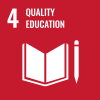Türkiye, 11 September 2023 – In an era where almost everyone owns a computer, laptop or smartphone, are computer labs still needed in our schools?
At this unique time where the international community faces a confluence of crises and profound global transformations, the 2023 Sustainable Development Goal (SDG) Summit in New York (18-19 September) ought to be a moment of truth and reckoning: it is imperative that human mobility is incorporated into the Rescue Plan the UN Secretary-General is urging world leaders to deliver at the Summit.
In Türkiye, IOM is reinforcing efforts to advance SDG 4 (Quality Education) by supporting education for migrant children, accelerating the journey to the 2030 Agenda by reducing the digital divide.
As more and more students have access to advanced technology at home or in their pockets, it is natural to question the importance of classrooms filled with rows of bright monitors. However, two-thirds of all school-aged children around the world – 1.3 billion children between the ages of 3 and 17 – still do not have internet access at their homes. Many of these children also do not have access to private or shared computer facilities. In many parts of the world, computer labs still play a vital role in schools, creating inclusive and controlled learning environments that prepare children for their futures, regardless of their circumstances.
“It’s critical that we continue supporting children’s access to education and technology, especially for those who had to flee their homes years ago,” remarked IOM Project Assistant Fatih Alakuş.
To support communities in Türkiye hosting migrants, the International Organization for Migration (IOM) set up 27 laboratories, eight of which are in the earthquake-affected provinces of Adana and Osmaniye. Unfortunately, one of these eight laboratories became unusable due to the impact of the earthquake. Education and equal access to technology became even more significant in earthquake-affected regions, giving communities the knowledge and resilience they need to successfully handle the difficulties and aftereffects of such disasters.

The computer labs offer students the opportunity to build coding skills. Photo: IOM/Begüm Başaran
Islam had a computer before the conflict broke out in Syria, but he had to abandon it, along with everything else he owned, when his family fled to Türkiye in 2016. Now a sixth grader, he is enrolled in a public school in Adana, where he has proven to be an enthusiastic learner with a great aptitude for technology. The example set by his older brother and sisters, who have been successful in their own higher education journey, has inspired him to follow in their footsteps.
“I was the youngest student in my school in Syria, and I will never forget the day I obtained my first-year certificate. Everyone cheered as I walked across the stage to get it,” recalled the 11-year-old.
In a new country, learning through a new language, Islam was quiet and reserved during those first years – a stark contrast to the boy he was in Syria. After the third grade, when his Turkish skills rapidly improved, he began making new friends and became a dedicated student.
"When I first walked into the computer lab, I thought to myself, 'Finally, finally, I'll be able to use a computer after six years!' I was so happy," said Islam about the new computer lab set up by IOM in his school. Before having access to a lab, the curriculum at Islam’s school had a narrow focus, with everything taught on a smart board. Now, students are learning new programmes and coding methods, expanding their knowledge and skills.
"What I've learned today will be useful to me in the future,” said Islam, whose favourite afterschool activity is building model paper houses at home with his mother. He hopes to turn his hobby into a career one day by becoming a construction engineer.
On lab class days, he comes to school more excited, a testament to how computers positively impact teamwork and collaboration with classmates.

Islam wears a smile after completing his homework. Photo: IOM/Begüm Başaran
Naz is a tech-savvy sixth grader at the same school as Islam. Her passion for technology was ignited by her teachers, who encouraged her to participate in interactive projects involving game development. She spends her free time researching and reading about the latest technology trends, such as smart and sustainable house technology. Her dream is to become an interior designer and create modern, tech-infused homes.
When the computer lab opened, Naz was ecstatic as she no longer had to rely on her memory to recall the codes her teacher wrote on the smart board. Instead, she could write the codes alongside her teacher, and they would stick in her mind. She noticed that even her classmates who did not have access to the same resources as other students were able to participate and learn from one another.
The establishment of the computer lab not only made students more invested in their education, but it also led to the school offering after-hours courses that were quickly filled up.

The computer labs are inspiring young girls to consider a career in technology. Photo: IOM/Begüm Başaran
Today, in the aftermath of the earthquake, the computer labs play a crucial role in ensuring equal access to technology and supplementing traditional classroom instruction, while promoting teamwork and hands-on learning among students.
“By inspiring children to enjoy learning, IOM’s support aims to set them up for better futures, where they can access more opportunities,” added Torsten Haschenz, Senior Programme Coordinator.
With the digital divide widening inequality between countries and communities, improving access to technology has the potential to bring about significant change for future generations, leaving no child behind in this rapidly evolving world.
IOM set up the computer labs with the support of the US Department of State Bureau of Population, Refugees, and Migration (PRM).
This story was written by Begüm Başaran, IOM Türkiye communications team.


